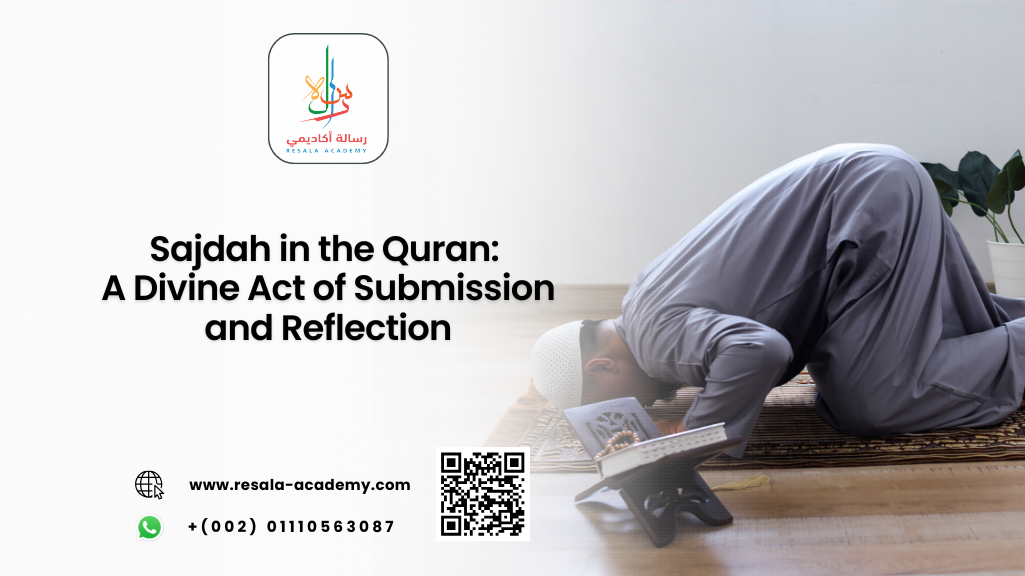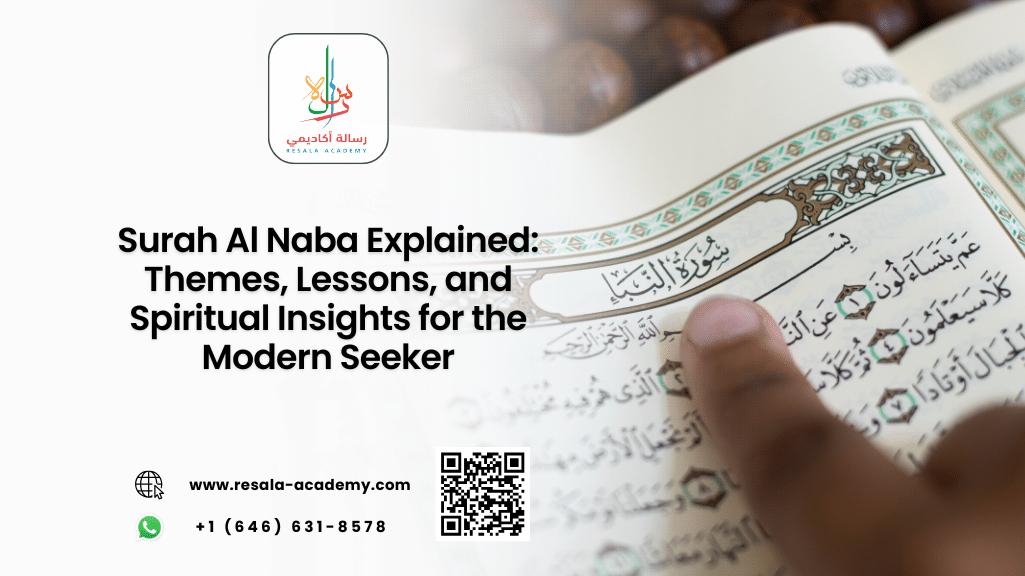Table of Contents
Sajdah in the Quran: A Divine Act of Submission and Reflection
Understanding the concept of Sajdah in the Quran is a profound journey into the heart of Islamic spirituality. For non-native speakers and learners of Arabic and Quranic studies, grasping the meaning, significance, and occurrences of sajdah (سجدة) is essential for deepening one’s connection with the Holy Quran and Islamic worship.
This comprehensive guide explores the spiritual, linguistic, and practical dimensions of sajdah, its mentions in the Quran, and how learners can master its understanding through expert-led courses at Resala Academy, a premier online institution for Arabic and Quran education.
What is Sajdah?
Sajdah (Arabic: سجدة) literally means “prostration.” It is the act of placing the forehead, nose, both palms, knees, and toes on the ground in complete submission and humility to Allah. In Islamic practice, sajdah is the pinnacle of physical worship, symbolizing the believer’s total surrender to the Creator.
In the Quran, sajdah is not only a physical act but also a spiritual symbol of obedience, reverence, and closeness to Allah. It is mentioned in various contexts—commanded, described, or referenced in the stories of prophets and believers.
The Linguistic and Spiritual Meaning of Sajdah
The root word of sajdah is س-ج-د (s-j-d), which connotes humility, submission, and lowering oneself. In Islamic theology, this act reflects the believer’s acknowledgment of Allah’s greatness and their own servitude.
Spiritual Dimensions of Sajdah
Closeness to Allah: The Prophet Muhammad ﷺ said:
أَقْرَبُ مَا يَكُونُ الْعَبْدُ مِنْ رَبِّهِ وَهُوَ سَاجِدٌ فَأَكْثِرُوا الدُّعَاءَ
“The closest that a servant comes to his Lord is when he is prostrating…”
(Sahih Muslim 482)Expression of Gratitude: Sajdah is a moment to express thanks, seek forgiveness, and glorify Allah.
Symbol of Tawheed (Monotheism): It signifies worship to Allah alone, distinguishing believers from those who prostrate to idols or other entities.
Read more about: Why the Hafs Quran is the Most Widely Used Recitation — and What That Means for New Learners
Sajdah in the Quran: Verses and Contexts
The Quran contains multiple references to sajdah, both as a command and as a description of the righteous. There are 15 verses known as Ayat al-Sajdah (verses of prostration), where it is recommended or obligatory to perform a physical sajdah upon recitation. Examples of Sajdah Verses
1. Surah Al-A’raf (7:206)
Arabic:
إِنَّ ٱلَّذِينَ عِندَ رَبِّكَ لَا يَسۡتَكۡبِرُونَ عَنۡ عِبَادَتِهِۦ وَيُسَبِّحُونَهُۥ وَلَهُۥ يَسۡجُدُونَTranslation:
“Indeed, those who are near your Lord are not prevented by arrogance from His worship, and they exalt Him and to Him they prostrate.”
2. Surah Al-Anfal (8:18)
Arabic:
أَلَمۡ تَرَ أَنَّ ٱللَّهَ يَسۡجُدُ لَهُۥ مَن فِي ٱلسَّمَـٰوَٰتِ وَمَن فِي ٱلۡأَرۡضِTranslation:
“Do you not see that to Allah prostrates whoever is in the heavens and whoever is on the earth…”
3. Surah As-Sajdah (32:15)
Arabic:
إِنَّمَا يُؤۡمِنُ بِـَٔايَـٰتِنَا ٱلَّذِينَ إِذَا ذُكِّرُواْ بِهَا خَرُّواْ سُجَّدٗاTranslation:
“Only those believe in Our verses who, when they are reminded by them, fall down in prostration…”
Types of Sajdah in the Quran and Sunnah
There are several types of sajdah practiced in Islam, each with its own context and significance.
1. Sajdah of Recitation (Sajdat al-Tilawah)
- Performed when reciting or hearing one of the 15 sajdah verses.
- It is a Sunnah Mu’akkadah (emphasized Sunnah).
- Non-obligatory but highly recommended.
2. Sajdah of Thankfulness (Sajdat al-Shukr)
- Done in gratitude to Allah for a blessing or deliverance from harm.
- Not tied to prayer times.
3. Sajdah in Salah (Prostration in Prayer)
- Integral part of the five daily prayers.
- Performed multiple times in each unit (rak’ah).
4. Sajdah of Forgetfulness (Sajdat al-Sahw)
- Performed to compensate for mistakes in prayer.
Sajdah and the Stories of the Prophets
The Quran narrates incidents where prophets and the righteous performed sajdah as an act of devotion.
Adam (AS) and the Angels
Arabic:
وَإِذۡ قُلۡنَا لِلۡمَلَـٰٓئِكَةِ ٱسۡجُدُواْ لِـَٔادَمَTranslation:
“And [mention] when We said to the angels, ‘Prostrate before Adam’; so they prostrated…”
(Surah Al-Baqarah 2:34)
This sajdah was not of worship but of honor, commanded by Allah to the angels.
The Etiquette of Performing Sajdah
For learners, especially non-native speakers, understanding the proper etiquette of sajdah is crucial.
Proper Steps for Sajdah
Ensure cleanliness and facing the Qiblah.
Say “Allahu Akbar” before going into sajdah.
Place the seven body parts on the ground.
Recite:
سُبْحَانَ رَبِّيَ الأَعْلَى
Subhana Rabbiyal A‘la
(Glory is to my Lord, the Most High)Rise with “Allahu Akbar” and continue the prayer.
Hidden Linguistic Gems in Sajdah Verses
The verses of sajdah in the Quran are not only spiritually enriching but also linguistically profound, offering learners a deep dive into Quranic Arabic. Each sajdah verse is crafted with eloquence, showcasing the divine precision of the Arabic language.
For students of Arabic and Quranic studies, analyzing these verses can significantly enhance their comprehension and appreciation of the Quran’s linguistic beauty.
- Advanced Vocabulary Exposure: Sajdah verses often include high-level Arabic terms such as kharrū sujjadan (they fall in prostration), yastakbirūn (they are arrogant), and yusabbiḥūnahu (they glorify Him), which are excellent for vocabulary expansion.
- Syntax and Grammar Patterns: These verses frequently employ unique grammatical structures like jumlah ismiyyah (nominal sentences) and jumlah fi‘liyyah (verbal sentences), offering practical examples for grammar application.
- Rhetorical Devices: Many sajdah verses use devices such as iltifāt (grammatical shift), tajnis (paronomasia), and tawqīd (emphasis), which are key to understanding Quranic eloquence.
- Contextual Learning: By studying the surrounding verses, learners can grasp the thematic flow and divine wisdom embedded in the Quran’s structure, making their study more holistic and meaningful.
Cognitive and Spiritual Benefits of Reflecting on Sajdah in the Quran
Beyond its ritualistic significance, reflecting on sajdah in the Quran fosters both intellectual and spiritual growth. For non-native learners, this reflection bridges the gap between theoretical knowledge and heartfelt connection with the divine message.
- Mental Focus and Mindfulness: Engaging with sajdah verses cultivates khushū‘ (concentration) in prayer and recitation, enhancing mindfulness and spiritual presence.
- Moral and Ethical Insights: These verses often highlight the humility of the righteous and the arrogance of disbelievers, offering ethical lessons that resonate across cultures and languages.
- Interdisciplinary Connections: Sajdah-related content intersects with fields like theology, linguistics, psychology, and comparative religion, making it a rich subject for academic exploration.
- Enhanced Quranic Fluency: Repeated exposure to sajdah verses improves fluency in Quranic recitation and comprehension, especially when guided by expert instructors at Resala Academy.
- Spiritual Motivation: Understanding the deeper meanings behind prostration inspires learners to internalize Islamic values and apply them in daily life, reinforcing their identity as conscious Muslims.
Sajdah in the Quran: A Tool for Language and Faith
For non-native speakers, studying sajdah-related verses offers dual benefits:
- Linguistic Mastery: Learn Arabic grammar, vocabulary, and syntax through real Quranic examples.
- Spiritual Growth: Understand the depth of Islamic worship and its divine origins.
Why Learn About Sajdah with Resala Academy?
Resala Academy is a leading online platform that specializes in teaching Arabic and Quran to non-native speakers. With expert instructors, interactive classes, and a curriculum rooted in classical and modern pedagogy, Resala Academy empowers students to:
- Recite and understand the Quran with proper Tajweed.
- Learn the meanings and contexts of sajdah verses.
- Practice Islamic rituals with confidence and accuracy.
- Engage in live sessions with native Arabic-speaking scholars.
Prostrate Your Way to Knowledge: Enroll with Resala Academy Today!
Are you ready to deepen your connection with the Quran and master the beauty of sajdah? At Resala Academy, we believe that every learner deserves access to authentic Islamic knowledge, regardless of their background or location.
Whether you’re a beginner or an advanced student, our personalized courses in Arabic and Quranic studies will guide you step-by-step. Learn how to perform sajdah correctly, understand its meanings in the Quran, and explore the rich tapestry of Islamic worship.
🔗 Join Resala Academy Now and transform your learning journey into a spiritual awakening.
FAQs About Sajdah in the Quran
1. What is the significance of sajdah in the Quran?
Sajdah symbolizes submission to Allah and is a recurring theme in the Quran. It appears in stories of prophets, commands to believers, and descriptions of the righteous. It reflects humility, gratitude, and devotion.
2. How many sajdah verses are there in the Quran?
There are 15 recognized Ayat al-Sajdah. Upon reciting or hearing these verses, it is recommended to perform a prostration as a sign of reverence.
3. Can non-Arabic speakers learn how to perform sajdah correctly?
Absolutely. Institutions like Resala Academy offer structured lessons that teach both the physical and spiritual aspects of sajdah, including pronunciation, meaning, and context.
4. Is sajdah obligatory when reading the Quran?
Performing sajdah upon reading a sajdah verse is highly recommended (Sunnah Mu’akkadah), but not obligatory. However, it is a beautiful act of devotion that enhances one’s connection with the Quran.
5. How can I memorize the sajdah verses?
You can memorize sajdah verses by:
- Enrolling in Quran memorization classes at Resala Academy
- Listening to audio recitations
- Using flashcards and repetition techniques
- Understanding the meaning and context of each verse
Conclusion
The concept of sajdah in the Quran is more than a ritual—it is a profound act of love, humility, and surrender to the Creator. For non-native speakers, understanding sajdah opens the door to both linguistic mastery and spiritual enlightenment.
Through the guidance of expert educators at Resala Academy, learners can explore the depths of Quranic meanings, perfect their recitation, and embody the essence of Islamic worship.
Let your journey to divine connection begin with a single sajdah—learn it, live it, and love it with Resala Academy.
Start Learning Today at Resala Academy. Master Arabic, Understand the Quran, and Embrace the Beauty of Sajdah




